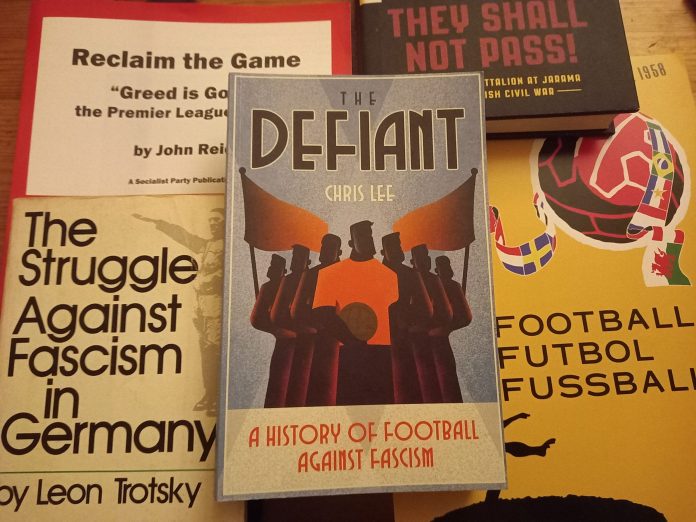Scott Jones, East London Socialist Party
The Defiant, with its cover inspired by a Republican Spanish Civil War-era poster, details the “history of football against fascism”. It comes out to coincide with the 100th anniversary of Mussolini’s ‘March on Rome’, when Mussolini came to power in Italy, leading the world’s first fascist government (see ‘100 years since Mussolini’s March on Rome’).
From the start, Mussolini both used and faced opposition from football, and that’s where the book begins, looking at players who refused to give the fascist salute before matches in the new Serie A football league founded by Mussolini in 1929.
Author Chris Lee points out that the rise of fascism in the 1930s coincided with sporting events becoming truly international during the decade. Both the World Cup and Olympics were held in countries with fascist governments, in Italy in 1934, and Berlin in 1936, respectively.
Mussolini used the former as a propaganda tool and the Italians won on home soil. Hitler attempted to use the Berlin Olympics similarly. Although, on the field of play he was shown up by players refusing to give the Nazi salute and a defeat for Germany, and off it by teams leaving early in protest, like Peru after controversial refereeing.
Elsewhere, left-wing athletes arranged a completely separate games in Barcelona (see ‘Barcelona 1936: the people’s Olympics’), while others who did take part, like black American Jesse Owens, stuck two fingers up to the regime by winning gold medal after gold medal.
But it was at the 1938 World Cup in France where things came to a head – the last major tournament before World War Two. Matches involving Italy and Germany faced protests by anti-fascists and exiles from the countries. But there were also protests from Spaniards and supporters of the Spanish Republic, which was on the verge of being defeated and overthrown by a fascist uprising, including support from Germany and Italy. In some matches bottles were hurled from the stands.
The book looks at plenty of inspirational examples of football fans, players and clubs fighting fascism and the far right. From Spanish players who fought fascism in the civil war, to those who fought as resistance fighters and partisans from France to the Balkans in World War Two, with the match that inspired the film Escape to Victory in between.
The Defiant describes, probably for the first time in English, the role of Portuguese club Académica in the uprising in 1968 against right-wing dictator Salazar, which led to his downfall. The book also takes us through the pitched battles against far-right and neo-Nazi ultras in the 1970s and 80s, and those who took them on, to examples of anti-fascism in football across Europe and beyond to this day.
Football is political. The emergence a few years ago in Britain of the far-right Football Lads Alliance, and some recent high-profile examples of racist incidents, show the need to continue the fight against fascism and the far right in football and society.
This is done by winning football fans and working-class people to the need to reclaim our game and clubs as whole from the billionaires, and transform society by fighting against the conditions and inequality of capitalism, which can sow the seeds of fascism, and for an alternative – socialism.
- The Defiant by Chris Lee by Pitch Publishing is out now, available for £12.99
- Read more about the fight against the far right in football and a programme to transform the game: ‘Reclaim the Game’ by John Reid, £5 from leftbooks.co.uk
- Read more about what the Socialist Party says about fascism, see ‘Global economic and political crises: Is fascism on the march?’







